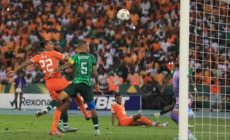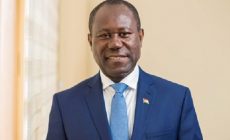Ivory Coast denies sending hit squads to Ghana to kill followers of Laurent Gbagbo
- Posted on
- Comment
 Ivory Coast on Monday denied a United Nations report that it sent hit squads to Ghana to kill followers of former president Laurent Gbagbo, who was forced to cede power in 2011 after a post-election crisis.
Ivory Coast on Monday denied a United Nations report that it sent hit squads to Ghana to kill followers of former president Laurent Gbagbo, who was forced to cede power in 2011 after a post-election crisis.
“At this stage, we can’t give much credit to what has been said,” government spokesman Bruno Kone told a press conference, criticising “inadequacies” in the UN report.
“(The report) itself says the experts are not in a position to independently verify the information given by the Ghanaian government,” he said.
“President Alassane Ouattara has been in power for two and a half years now,” he added. “Those aren’t our methods.”
The report, obtained Sunday by AFP, says Ghana’s government told UN sanctions experts they had “foiled” at least two missions this year by Ivory Coast agents to kill or abduct Gbagbo associates.
It also said Ivory Coast paid off Liberian mercenaries and Ivorian militia commanders to stop them from staging attacks to destabilise Ouattara’s government.
Last year, a series of cross-border raids from Liberia into western Ivory Coast — blamed on Gbagbo loyalists — killed seven UN peacekeepers and caused thousands of people to flee their homes.
Ivory Coast is still wading through the aftermath of the 2010-2011 crisis, when Gbagbo refused to accept his election loss to Ouattara, sparking four months of fighting that killed more than 3,000 people.
The standoff ended with Gbagbo’s arrest at his presidential bunker in Abidjan by French- and UN-backed forces. He is currently in custody at The Hague awaiting trial at the International Criminal Court on charges of crimes against humanity for his role in the crisis.
The UN report was written to the Security Council by experts charged with monitoring UN sanctions against Liberia.
The experts said they had been unable to “independently verify” the claims about Ivorian hit squads.
But they said they had “gathered substantive information” concerning payments made by the Ivory Coast government to “key Liberian mercenaries”, including Isaac “Bob Marley” Chegbo and Augustine “Bush Dog” Vleyee.
-AFP










 (Selorm) |
(Selorm) |  (Nana Kwesi)
(Nana Kwesi)